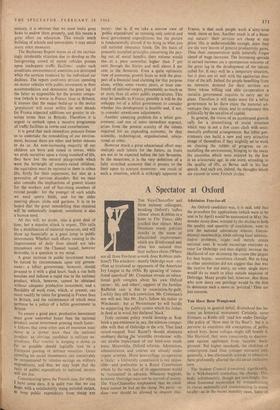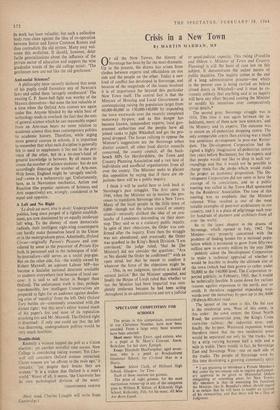A Spectator at Oxford
THE Vice-Chancellor and three eminent colleagues, breaking Oxford's 'sullen silence' about Robbins in a letter to The Times, ably justified that silence. Most Oxonians resent political attacks in the name of educational improvement which are ill-informed and often less rational than their authors claim. (Where are all those five-hour-a-week dons Robbins men- tions?) The attackers—mostly Oxbridge men—are often as irrational as opponents of the American Ivy League in the 1950s. By speaking of 'educa- tional apartheid' Mr. Crossman reveals an educa- tional guilt complex about his own Oxford career: his, and others', support of the familiar Redbrick case is due to association-by-guilt. Luckily they still lack conviction. Mr. Crossman's son will not, like Mr. Jay's, follow his father to Winchester: but at Westminster he will hardly be supporting the public system which his father, in deed as in word, has declared 'black.'
Truly rational policy would develop at Red- brick a pre-eminence in, say, the sciences compar- able with that of Oxbridge in the arts. That (and mixed-manned Boat Races?) should eliminate snobbery during „the 'scientific revolution' with- out unwise impairment of our hard-won excel- lence. Meanwhile, Oxford reforms. Admissions, administration and courses are already under urgent scrutiny. More inter-college co-operation is likely: a University commission is not impos- sible—and preferable to a Royal Commission which by the very fact of its appointment would be 'committed' in advance. Whatever happens, however, Oxbridge must not be starved of money. The Vice-Chancellor emphasised that its excel- lence cannot be had on the cheap. No party—or class--•war should be allowed to obscure that. Admission Free-for-all
An Oxford candidate was, it is said, told that the procedure for applications (which were to be sent in by April) would be announced in May. No wonder many dons, worried by the decline in both the quality and quantity of candidates, want to join the national admissions scheme. Uncon- ditional membership, while solving local adminis- trative problems, might well merely create national ones. It would encourage everyone to enter for Oxbridge and thus slightly increase the likelihood of our skimming the cream (the jargon for best brains: sometimes clotted). But as long as other universities did not suggest that that was the 'motive for our entry, no other single move would do so much to allay outside suspicion of Oxbridge. Many people feel, however, that those who now decry our privilege would be the first to denounce such a move as 'political.' They are just enemies.
You Have Been Waugh-ned
Contrary to general belief, Brideshead has be- come an historical monument. Certainly, some Etonians at Keble still 'read law under Davidge' (the policy of 'three men in the Boat'): but it is perverse to overstress old conceptions of public school boys. Some colleges might still benefit if, like Harvard, they were consciously to discrimi- nate against applicants from 'suitable' back- grounds. But higher standards, the abolition of conscription (and thus younger entrants) and, generally, a less dilettantish attitude to education have profoundly affected the old social exclusive-
'ness.
The Student Council (conceived, significantly. by a Wykehamist) symbolises the change. This body, unfortunately, though not unwillingly, has often frustrated moderation by overpublicising its claims nationally and overestimating its status locally—as in the recent morality cases. Some of
its work has been valuable; but such a collective body runs clean against the idea of co-operation between Senidr and Junior Common Rooms and thus contradicts the old system. Many may wel- come this evolution. It should, however, deter facile generalisations about the influence of the private sector of education and support the wise gradualist words of the old college scout: 'The gentlemen now are not like the old gentlemen.'
Anti-social Sciences?
A philosophy tutor recently declared that none of his pupils could formulate any of Newton's laws and called them 'savagely uneducated.' The ensuing C. P. Snow-ball fight was worthy of the Masters themselves—but none the less valuable at a time when the Oxford Arts courses are again under fire. Anyone blinded by the white heat of technology tends to overlook the fact that the sort of general science which he can reasonably expect from an Arts-man bears no more relation to academic science than does contemporary politics to academic history. Therefore, while urging more general courses in schools, it is important to remember that what each discipline is generally felt to need to supplement it lies not in the pro- vince of the other, but in a no-man's-land of general knowledge in between. By all means in- crease the number of science students: but do not accordingly disparage the number of Arts-men. With fewer, England might be 'savagely uncivil- ised'—even in a technocratic age. Unfortunately, here, as in Newtonian mechanics, Action and Reaction (the popular opinions of Sciences and Arts respectively) are, wrongly, considered to be equal and opposite.
A Left and No Right 'Le droit est mort, vive le droit.' Undergraduate politics, long since purged of a rightist establish- ment, are now dominated by an equally intolerant left wing. To the dismay of more democratic radicals, their intelligent right-wing counterparts can hardly make themselves heard in the Union or in the undergraduate press. Admittedly, Oxford Circus—originally Parson's Pleasure and con- sidered by some as the precursor of Private Eye both in personnel and in the techniques of trial- by-journalism—still serves as a social pop-gun. But on the other side, Isis—the weekly owned by Robert Maxwell, an aspirant Labour MP—has become a Socialist national deterrent available to students everywhere (not because of local suc- cess: it is said to sell better in Bangor than Oxford). The unfortunate truth is that, perhaps reprehensibly, few intelligent Conservatives are prepared to fight for an audience against deafen- ing cries of 'equality' from the left. Only Oxford Tory battles on—commonly associated with the distant right: but this term's editor wasted much of his paper's fire and most of its reputation attacking Isis and Mr. Maxwell. The Oxford right is disarmed: if only one could say that the left was disarming, undergraduate politics would be very much healthier.
Double-think Recently a woman topped the poll at a Union election : yet another morality case occurs. New College is considering taking women. Yet Cher- well still considers. Oxford women ostracised. Clever women are 'an affront to the male ego,' it remarks: 'yet despite their brains they are women.' It is a truism that Oxford is a man's world.' Worst of all, it seems, 'the University has its own pathological division of the sexes.'
CHRISTOPHER MAKINS
(Next week Charles Lysaght will write from Cambridge.)



































 Previous page
Previous page